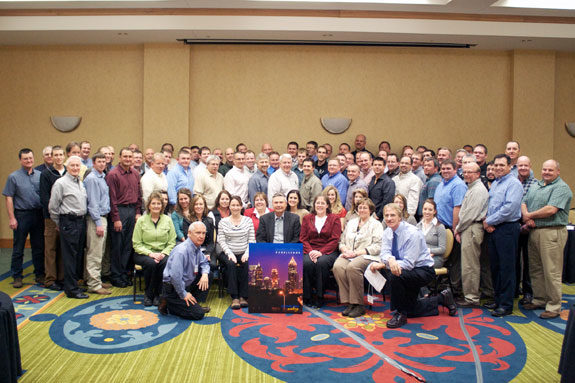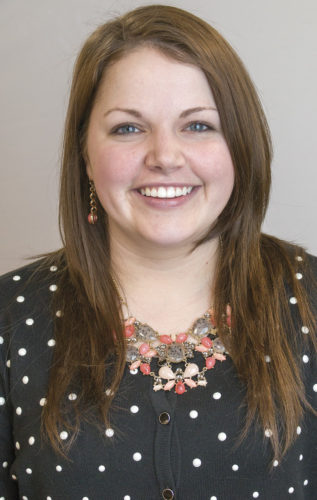In addition to having discussions about the dairy industry, attendees of the 2012 Managers Academy, held Jan. 17-19 in Atlanta, Georgia, were able to learn about the peach, peanut and poultry industries. They also toured three organizations headquartered in Atlanta: the Centers for Disease Control, CNN and AGCO.
Managers Academy kicked off with a morning of discussion led by Virginia Tech’s David Kohl and Texas A&M’s Danny Klinefelter. Both presentations focused on management planning.
Scroll down or to see more photos.
Kohl discussed how to handle “black swans,” which are unusual events that significantly alter the way producers manage. Examples included the price of oil, social and political unrest and disasters like a disease outbreak or an earthquake.
Can you manage these black swans? Yes, but it’s going to take preparation, according to Kohl.
“You have to do scenario testing,” Kohl says. “Determine several different possibilities, figure out the probabilities of those occurrences and monitor them. Develop systems for handling each one.”
Klinefelter agreed. Scenario planning was one of his list of “10 things that 95 percent of agricultural producers don’t do.”
A good start for scenario planning is to focus on the 4 D’s: death, divorce, disability and departure, Klinefelter says.
Another item on his list that resonated with producers was to perform “autopsies” on business choices.
“Analyze the results of major decisions,” Klinefelter says. “Figure out what went wrong – what you could have done better. Ask yourselves, ‘What did we miss?’”
Story continues below photo slideshow.
Find more photos like this on Proud to Dairy
Following the morning presentations, a panel of four of Georgia’s agricultural industry leaders provided attendees with a glimpse into their respective businesses.
Georgia Tech’s Douglas Britton discussed ongoing research projects in food safety engineering and the future of product grading, particularly in poultry. Mike Giles of the Georgia Poultry Federation talked about the growth of the Georgia poultry industry and described the importance of international trade, not only to poultry farmers’ bottom lines, but also to meet international demand for protein.
Peach industry expert Cynde Dickey described the history and future of Dicket Farms, Georgia’s oldest, continuously operating peach packinghouse. She particularly had dairy producers’ attention when she discussed challenges with immigration and the development of a guest worker program.
“It’s going to take all of us working together,” Dickey says. “In order to develop a national guest worker program, all sectors of agriculture are going to have to pull together.”
Executive Director of the Georgia Peanut Commission Don Koehler opened up about recent peanut recalls and what the industry learned from their experiences.
“You can’t prepare for a crisis,” Koehler says. “You have to know how you’re going to react ahead of time.”
He advised the dairy industry to train the best spokespeople to know when to become proactive.
“Get your message out and stay focused,” he says. “The media came to us, and we didn’t run from them.”
Attendees had a change to learn more about the media firsthand when they toured CNN’s facilities the following day. The group was led past several newsrooms and studio setups.
A discussion with James Morrison, Jr., the senior assignment manager of CNN Southeast Region, led producers to realize that the dairy industry needs to do more reaching out to the media and to help them find resources when a dairy story becomes breaking news.
Prior to CNN, participants visited the Centers for Disease Control Center, where they learned one in six people each year contracts a foodborne illness. The most common sources of a foodborne disease come from poultry, fish and beef, but dairy accounts for about 5 percent of most cases.

The tour day ended with several presentations and a dinner at AGCO, an agricultural equipment manufacturer whose core brands include Challenger, Fendt, Massey Ferguson and Valtra.
Human Resources Senior Vice President Lucinda Smith left producers with something to think about when she described the company’s focus on succession planning. In 2002, a tragic plane crash took the lives of AGCO’s president and CEO, John Schumejda, and Senior Vice President of Sales Ed Swingle.
Irreplaceable knowledge and experience, as well as several of the intended goals of the company, were lost.
As a result, AGCO management now makes sure critical positions would be able to be filled quickly and efficiently. Company staff selects potential replacements, both within the company and outside of it. Specific duties and responsibilities of positions are also communicated to all team members involved.
As for developing new talent, Smith says the company has a “70-20-10” rule: 70 percent of the employee’s time is spent on the job, 20 percent is spent through being coached and/or mentored and only about 10 percent is spent through classroom training.
As part of Managers Academy participants’ classroom training, they also heard from Rabobank’s global dairy strategist, Tim Hunt, who discussed the global demand for dairy and some challenges of emerging countries.
The final day of the conference included a talk from Guido van der Hoeven of the North Carolina Society of Farm Mangers and Rural Appraisers. He presented some of his key takeaways from a recent trip to New Zealand. He encouraged dairy producers to “develop a strategic plan, then tactically implement the plan.”
Northwest Farm Credit Service’s past president and CEO Jay Pennick discussed what producers should know before entering into a loan. He encouraged attendees to look for a lender that understands the dairy industry and understands dairying as a business. He also advised that producers establish a cash reserve for emergencies and to stick to budgets.
At the end of the conference, Kohl and Klinefelter asked participants to address the most important item they would be taking away from the conference. The most common responses from producers were they wanted to complete scenario and succession planning, paying attention to managing black swans and being in a position where they could take advantage of the next dairy industry opportunity.
Several others mentioned they wanted to identify and meet with peer groups that pushed their limits and continue some of the discussions and ideas that the 2012 Managers Academy sparked. PD
Look for information about the 2013 Managers Academy from Progressive Dairyman and the Professional Dairy Producers of Wisconsin .
PHOTOS
TOP: Nearly 100 dairy producers and dairy company representatives participated in the 2012 Managers Academy, held in Atlanta, Georgia, Jan. 17-19.
BOTTOM: While touring AGCO facilities, producers were directed to an oil painting in the conference room. The painting, called “The Gleaners” (Des glaneuses) by Jean-Francois Millet, inspired the name of the Gleaner Manufacturing Company, which was acquired by Allis-Chalmers, a company that became part of AGCO in the ’90s. Photos by PD Editor Emily Caldwell.





